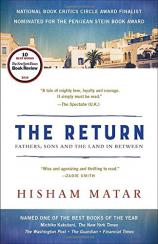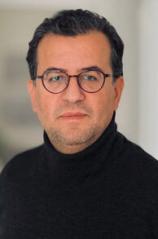The Return: Fathers, Sons and the Land in Between
Review
The Return: Fathers, Sons and the Land in Between
"For a quarter of a century now, hope has been seeping out of me. Now I can say, I am almost free of it. All that remains are a few scattered grains." Hisham Matar lost his father, long ago and far away, after enjoying only a few years of his presence. Jaballa Matar, a noted Libyan dissident who ran afoul of the cruel, secretive, violent regime of Muammar el-Qaddafi, went missing in 1990. Hisham, a successful writer living comfortably in London, traveled to Libya in 2012 to look for clues.
Based on scraps of information and snatches of conversation, Hisham had some hope that Jaballa might be alive. Someone saw him, someone heard about him, word got out, even from the insane system that incarcerated men in the bowels of Abu Salim prison for decades under the harshest of conditions, lacking even the merest chance of a hearing or release. In the brief period after Qaddafi's overthrow and before the incursion of Islamic militants to fill the Libya power vacuum, Hisham and his mother went to the country that had been her birthplace, his fleeting childhood outpost. There he questioned anyone who might have a thread of memory about his father.
"A novelist who continues to bring the Libyan struggles to our attention through his journalistic essays, Hisham Matar has constructed a work of nonfiction with many of the elements of a taut international spy story."
The clues dried up like leaves in the wind. Someone who claimed to have seen Jaballa did not recognize his photograph. A blind man in solitary confinement at Abu Salim had a photograph of Jaballa. Why? There were alluring tales: When prisoners were being taken to be tortured, Jaballa would shout defiantly, unseen, “Boys, if you get stuck, say Jaballa Matar told you to do it.” That would make it easier on them, give them a name to name, the name of the fearless dissident who was always ready to die.
Though he discovered little about the fate or whereabouts of his father, Hisham gleaned much about how the regime worked its horrors. In Abu Salim, broadcasts of Qaddafi were screamed into every cell for hours on end. Brutal guards with no other motive than pure selfishness lied to desperate families about prisoners who had died, taking lovingly home-cooked meals and gifts of clothing for themselves, month after month, year after year. Jaballa may have been among the 1,200-plus inmates mercilessly gunned down after prisoners rioted in 1996. No proof of that has emerged, but so many who perished there left no trace.
A novelist who continues to bring the Libyan struggles to our attention through his journalistic essays, Hisham Matar has constructed a work of nonfiction with many of the elements of a taut international spy story. He leaves us guessing, as he still must, about the fate of his father, while starkly detailing the perfidies committed by the downed regime that has been replaced by nothing better. Jaballa Matar was, or is (Hisham believes that this verb tense can never be totally settled), a courageous, intelligent man battling a hateful system. The son, in this forthright account, projects many of the same qualities that he extols in the father.
Reviewed by Barbara Bamberger Scott on July 8, 2016
The Return: Fathers, Sons and the Land in Between
- Publication Date: April 4, 2017
- Genres: Memoir, Nonfiction
- Paperback: 272 pages
- Publisher: Random House Trade Paperbacks
- ISBN-10: 0812985087
- ISBN-13: 9780812985085





